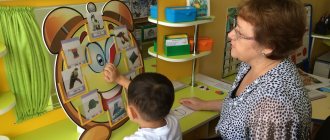A referral to a commission to register a child in a speech therapy group causes protest and anxiety among parents. Many parents feel that the goal of the commission members is to make a diagnosis and issue a certificate, but they are not interested in the needs of the baby.
In addition, hearing about a correction group in a preschool educational institution (preschool educational institution), parents have the feeling that their beloved child is mistaken for a mentally retarded person. And they, having rejected the voice of reason, strive to prove the opposite to everyone. Although the conclusion of a speech therapist is the first step towards eliminating the defect. After all, the earlier a violation is detected, the easier it is to deal with it.
What is a speech therapy group and who needs it?
The correctional group in kindergarten is designed to create optimal conditions for children with severe speech impairments to eliminate the defect, master the program for preschoolers and prepare for literacy (reading and writing) at school.
In the speech therapy group, educators and defectologists work on establishing correct articulation, improving the perception and recognition of phonemes by ear, increasing passive vocabulary, developing coherent oral speech, and eradicating grammatical errors. Additionally, classes are conducted that develop fine motor skills of the fingers, the ability to draw, strengthen memory, promote concentration, and the development of imaginative and spatial thinking. This comprehensive approach allows you to quickly eliminate speech underdevelopment.
Corrective work is carried out jointly by a speech therapist, a teacher, a physical teacher and a kindergarten music worker.
How to get a certificate from a speech therapist
A speech therapy report can be obtained from a specialist at a clinic at your place of residence or at any private institution.
Many parents prefer to seek help from specialized centers. This is more convenient for many reasons:
- There is no need to wait a long time for your turn. As a rule, not every public clinic has a speech therapist on staff. This means that parents have to spend time getting a referral and then wait for an appointment. A lot of children come and a specialist often simply does not have enough time for a quality examination.
- In a private center, you can choose the most suitable time for the visit - one that will be convenient for both parents and corresponds to the child’s daily routine. After all, if the examination takes place at a time when the child does not feel well, is hungry or tired, he is unlikely to be able to concentrate and perform at his best.
- Specialized centers employ highly qualified speech therapists and speech pathologists. A thorough examination will help identify all possible problems, which means corrective work can begin as early as possible.
PMPC - what is it?
The commission for the speech therapy group is called PMPC and stands for psychological-medical-pedagogical. Children 4–5 years old with severe speech disorders are referred to PMPK.
The purpose of the commission is a comprehensive examination of the small patient, identification of speech disorders, recommendation of the necessary training program and duration of correction.
The PMPC includes:
- pediatrician (children's general practitioner);
- clinical psychologist;
- psychiatrist or psychoneurologist;
- speech pathologist or speech therapist.
The teacher or head of the preschool educational institution can recommend taking the commission. Parents can also initiate an examination on their own, believing that the child needs the help of a speech therapist.
Speech therapist's certificate
A certificate from a speech therapist (signed and stamped) is given to parents (legal representatives) after a comprehensive diagnosis of the child’s speech, which is carried out in a playful manner in the presence of parents and takes about 60 minutes. If necessary, we will make a note of the examination results in the medical record. In addition to the document itself, you will get a complete picture of the child’s speech capabilities and existing disorders, if any.
Most often, a certificate is needed for a kindergarten or school. The corresponding conclusion in hand allows you to apply for a place in a specialized kindergarten or in the speech therapy group of a kindergarten. It is worth noting that not all parents want their children to study in such a group or to get into special education. garden. And they may be right: we often encountered cases where children were identified as such, but this was not required - it was enough to correct the disorder rather than send the child to specific conditions.
It is worth getting a certificate for the school because it makes it possible to apply for additional speech therapy classes, if necessary. Also, some schools do not provide classes with a speech therapist, and the performance of a student with speech therapy errors is considered on an equal basis with ordinary students. In this case, providing a certificate to the teacher can influence his attitude towards your child, and will allow you to avoid bad grades while you are correcting existing violations.
Before issuing a document and putting his stamp and signature on it, the speech therapist conducts a speech diagnosis, collecting speech history data, using information from the parents about how pregnancy and childbirth proceeded, when the baby developed the first syllables, words and phrases, what diseases he suffered and at what age.
After a conversation with the parents, the speech therapist invites the child to complete tasks specially selected for him. With their help, he determines how developed the understanding of speech is, what he is able to say independently. During the examination, it is important that the child feels calm and confident. To do this, the speech therapist establishes trusting contact with him, which allows him to open up and show his existing knowledge and skills to the maximum.
After this, the specialist analyzes the results and draws up a conclusion. It shows which components of the child’s speech are impaired: phonetics, grammar or vocabulary, and how much. The child may not pronounce certain sounds, may not be able to formulate phrases and sentences, may not coordinate parts of speech, and may have an extremely limited vocabulary. All these disorders occur together or separately, and many children suffer from them to varying degrees.
In some cases, all these pathologies occur simultaneously. In younger schoolchildren, oral speech disorders affect the development of reading and writing. If there are such problems, they are also recorded in the speech therapist’s report, specifying the form of the violations.
A complete examination of a child by our specialist allows us not only to accurately assess his level of development and obtain a conclusion. We will advise you in detail and give recommendations on the further development of your child’s speech, and tell you about ways to correct existing problems, if any.
And so that you do not forget the details of communication with a speech therapist, 2 days after the completion of the diagnosis, we will send a conclusion to your email, where the results of the examination will be described and recommendations of the specialist will be given.
How to get on the commission?
The first thing that is necessary is to take a referral for a PMPK examination in kindergarten, from a speech therapist or pediatrician. Then you need to prepare the necessary package of documents. It includes the conclusion:
- ophthalmologist;
- otolaryngologist;
- pediatrician or family doctor;
- psychiatrist or neurologist.
From the preschool educational institution that the child attends, you need to take a reference from the teacher and speech therapist, certified by the signature of the head and a wet seal.
Then the date of the commission is specified. Registration for examination is carried out at the city center for psychological, medical and pedagogical support. When undergoing the examination, parents provide passports, the baby’s birth certificate and a prepared package of documents.
Certification of speech therapists for category
The certification procedure is the same for all specialists - from physical education teachers to speech therapists. A young specialist can apply for certification for the first category at any time. But he should work for at least a year to gain the necessary experience and materials for his portfolio.
The speech therapist must submit an application to the certification commission. Some regions require supporting documents, for example, a diploma, an extract from the work book. You also need to obtain a reference letter from the educational organization, signed by the director.
Next, the speech therapist needs to fill out a portfolio - this rule works for all regions. In most regions, the portfolio is completed electronically. The teacher uploads documents confirming the results of his work, assigns self-assessment points and publishes the portfolio online. If there is no Internet portal in the region, the portfolio is submitted in written or electronic form to the education department. Accurate information should be requested from the founder of the organization. Then the portfolio is handed over to the expert, he assigns points and recommends or does not recommend that the certification commission assign a category to the candidate. Even if the speech therapist received a low score from the expert, he has the right to come to the meeting of the certification commission and speak in his defense.
In some regions, the speech therapist may be required to hold an open session or conduct a review of their office or work area.
What happens at the commission?
Parents come to the examination with their baby. The PMPK meets collegially in one room. A speech pathologist, clinical psychologist, teacher, psychiatrist or neurologist talks with the baby in the presence of adults.
The listed doctors are located at the same table, communicating with the child standing opposite them. Or they are at different tables, and the baby takes turns approaching each person present. During the examination you will have to answer questions and complete tasks.
The atmosphere of the commission can frighten the child. Specialists do not try to find an approach to the baby; they ask questions hastily, without giving time to think.
The duration of the examination is from one to two hours. It is important that parents reassure the child and are able to protect against an overly harsh tone or an incorrect diagnosis. It is worth bringing food and water for your baby.
How to quickly register for a children's speech therapy commission
The process of obtaining a certificate in most cases takes from several weeks to several months.
. Many people know firsthand how long it takes to go through all the necessary doctors at the clinic and receive opinions from them. After receiving the necessary conclusions, you will not be able to immediately get to the speech therapy commission; it is carried out by appointment.
Under tight deadlines, some parents are trying to buy a speech therapy commission
.
But a document obtained in this way is illegal and can cause a lot of trouble. If you need to get a certificate urgently, our center’s specialists will help you complete the document in 1 day without queuing or running around the clinic
.
The certificate is issued at a public or private medical center in accordance with all current rules of the Ministry of Health of the Russian Federation.
Leave a request for a document
Order registration
Or call and get advice from a specialist at the Center for Medical Commissions
How to prepare?
Before the examination, you need to explain to the child what is required of him, explain in what form the conversation will take place. You can ask your child the questions that will be discussed at the commission in a calm home environment. They depend on the age of the baby and the preliminary diagnosis.
At the commission, experts ask:
- Tell about yourself and your family: name, age, place of residence, occupation of parents. Describe what the baby prefers to play with friends, what to do with mom and dad. Name the teachers and nannies. Tell us about your pets: what’s their name, what they eat, how they play. Describe your house: number of rooms, purpose of the kitchen, toilet, bathroom.
- Tell him what he knows about the concepts of day and night, weekdays and holidays, describe his daily routine.
- Name the colors and shapes of the objects shown in the pictures, their location (under the table, on a chair, above the window).
- Sort the pictures into groups: food, pets, furniture, toys. Find an extra item in the row and explain why.
- Name the parts of the body and their purpose.
- Remember a series of objects, turn around and find what has changed.
- Repeat the words spoken by the specialist in the same order.
They check the articulation and literacy of sentence construction in accordance with age standards. The child should know what synonyms are (fun - joy), antonyms (crying - laughter), homonyms (key, braid), give examples.
Then phonemic awareness is checked. To do this, the child names the syllables of a given word and counts the words in the spoken sentence. They check whether the baby perceives the meaning of words that are similar in articulation: bark - hole.
The level of coherent speech is analyzed by asking a small patient to compose a story based on a picture.
The perception of someone else's speech is assessed by giving the task to retell a short story. The baby should:
- demonstrate how he sings, jumps, eats;
- express your needs and feelings: tired, hungry, wants to sleep;
- catching or hitting a ball, jumping on one leg is an indicator of coordination of movements.
The tasks and questions asked by PMPC members are not difficult. It is important to understand the reason why the child could not complete them. This could be banal excitement, pedagogical neglect, poor understanding of the Russian language (if it is not the child’s native language) or underdevelopment of speech that requires correction.
It is necessary to test the child in advance so that he does not worry when he hears a question or task, and understands what awaits him. However, the diagnostic questions of PMPK are standard and any child of a certain age can cope with them.






